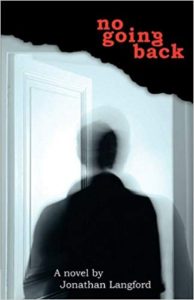 Title: No Going Back
Title: No Going Back
Author: Jonathan Langford
Publisher: Zarahemla Books
Genre: Mormon contemporary novel
Year Published: 2009
Reviewed by Jenifer Larson-Hall
Before reading Jonathan Langford’s novel No Going Back I was firmly convinced that I was not a homophobe, as I had had gay friends and acquaintances and had nothing personal against them. However, I am a Mormon, and I subscribed to the Church’s doctrine that acting upon homosexual impulses was a sin. Langford gave me insight into the life of a 15-year-old Mormon boy, Paul, who struggles with the paradox of realizing that he is gay and also wanting to follow the Church’s teachings. The book does an excellent job of helping the Mormon reader to empathize with the main character while also seeing the quandary he is in.
The story was a very quick read and quite engrossing. I even enjoyed the less well-developed story line about Paul’s best friend’s mother, Sandy, who is at first very reluctant to allow her son to continue his friendship with his gay friend, but who ultimately sees the love and nobility in her son’s strong friendship. What I thought the book really excelled at was conveying the reasons why Paul might feel the struggle to stay in the Church worthwhile. Perhaps these reasons do not seem very strong to the non-Mormon reader who sees nothing but futility in Paul’s desire to stay within a framework that calls his natural desires aberrant and destructive, but the Mormon reader will sense the beauty and strength of the situations where Paul repents and makes righteous decisions, receives priesthood blessings, and experiences the Holy Ghost telling him he is on the right path. Surely that path is the correct one for Paul at that point in his life, although with my limited knowledge of the experiences of gay Mormons who have chosen to try to stay, I sense that it may be well-near impossible to continue on that path for one’s entire life. This book is simply a slice of time in one boy’s life at age 15, a view into a world that will surely open the reader’s eyes to those around them who have no choice but to go forward but will need all the help that they can get from other members to continue to go on.
While reading it, I thought that it might be a very good book for teenage Mormons who realized they are gay, as it seemed to authentically represent their struggle. But in reading reviews of the book by current and former gay Mormons, I came to see that it might be too pessimistic a viewpoint for people who are looking for answers on how to reconcile themselves with a wish to be faithful members and also to someday find a partner and love in their lives.
Several reviews have remarked that the ending was unsatisfactory, because the main protagonist leaves the ward and high school where he has been outed as gay. He found comfort for a while in a Gay-Straight Alliance, where he found comfort for a while, but ultimately the group rejected him due to his Mormon beliefs. I thought his attempts to explain to other GSA members what the Church believes were heroic, but ultimately he is derided by the GSA members for his positions, and he is rejected by a group which could otherwise understand and sympathize with his sexual preferences. On the other hand, even though striving and ultimately succeeding in controlling his urges in order to stay faithful in the Church, he is rejected by nearly everyone in the Mormon community too, except his best friend and his Bishop. Ironically, he cannot feel accepted in either camp because of his values and courage in being honest about who he is and what he believes. After falling into depression, his mom decides he needs a new start and moves to Utah, where he very tightly guards his secret.
Jonathan Langford passed away in 2017, and cannot answer this question but I wonder if he too felt the ending to be unsatisfying. After all, the book is called No Going Back, but that is exactly what the main character seems to be trying to do. The book is an indictment for sure against Church members everywhere who say they hate the sin but love the sinner, but show very little compassion and no love for a person like Paul.
I think that Mormons of every age who may still feel that homosexuality is distasteful and would be willing to ostracize a faithful Church member for their unchosen sexual inclinations (or even simply doing nothing to express support for them) will benefit from reading the story. The novel helped me gain enormous sympathy for the struggles of members who experience same-sex attraction, and I realize that perhaps I could say I was homophobic to some extent before I had this experience. The book was transformative for me, and made me want to do more for gay members.
